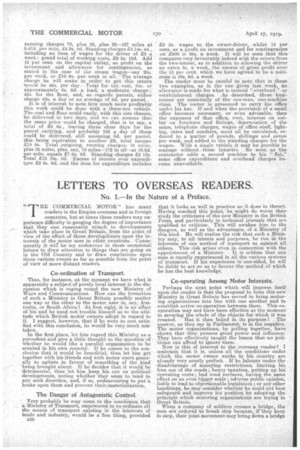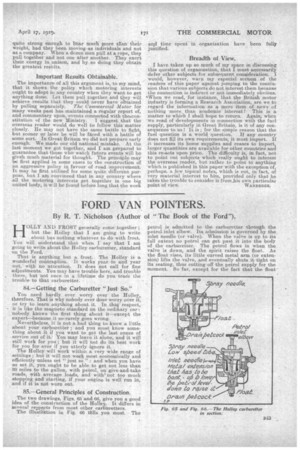LETTERS TO OVERSEAS READERS.
Page 16

Page 17

If you've noticed an error in this article please click here to report it so we can fix it.
No. 1.—In the Nature of a Preface.
THE COMMERCIAL MOTOR" has many readers in the Empire overseas and in foreign countries, but at times these readers may experience difficulty in gauging the degree of importance that they can reasonably attach to developments which take place in Great Britain, from the point of view of the effect of those developthents upon the interests of the motor user in other countries. Consequently it will be my endeavour in these occasional letters to draw attention to things that are going on in the Old Country and to draw conclusions upon these various events so far as possible from the point of view of more distant readers.
Co-ordination of Transport.
Thus, for instance, at the moment we have what is apparently a subject of purely local interest in the discussion which is raging round the new Ministry of Ways and Communications. How can the formation of such a Ministry in Great Britain possibly matter • one way or the other to the motor user in. say, Australia, or South Africa? At first sight, it is no affair of his and he need not trouble himself as to the attitude which British motor owners adopt in regard to it. I suggest, however, that if he were to rest satisfied with this conclusion, he would be very much mistaken.
In the first place, let him regard this Ministry as a precedent and give a little thought to the question of whether he would like a parallel organization to be created in his own country. If he comes to the conclusion that it would be beneficial, then let him get together with his friends and with motor users generally to agitate in favour of something of the kind being brought about. If he decides that it would be detrimental, then let him keep his eye on political developments, noting whether they seem to tend in any such direction, and, if so, endeavouring to put a brake upon them and prevent theirsmaterialization.
• The Danger of Antagonistic Control.
. Very probably he may come to the conclusion that a Ministry of Transport, empowered to co-ordinate all the Means of transport existing in the interests of trade and industry, would be a fine thing, provided 1338
that it looks as well in practice as it does in theory. Having reached this point, he might do worse than study the criticisins of the now Ministry in the British Press, and particularly in technical journals that are qualified to criticise. This will awaken him to the dangers, as well as the advantages, of a Ministry of this kind. He will realize the risk that such a Ministry may, to all intents and purposes, be run in the interests of one method of transport as against all others. This risk arises even in Connection with the appointment of a Minister. It is seldom that one man is equally experienced in all thevarious systems
i of transport. If his experience s one-sided, he will be liable to act so as to favour the method of which he has the best knowledge,
Co-operating Among Motor Interests.
Perhaps the next point which will impress itself upon the reader is that the proposal to form this new Ministry in Great Britain has served to bring motoring organizations into line with one another and to establish active co-operation between them. This cooperation may not have been effective at the moment' in securing the whole of the objects for which it was Created. Has it then failed in its purpose? The answer, as they say in Parliament, is in the negative. The motor organizations, by pulling together, have shown that they possess great power and influence. They have effectively taught the lesson that no politician can afford to ignore them.
Now is this of interest to the •overseas reader ? I maintain that it is, unless all the -conditions under which the motor owner Ay-I:irks in his eountry are already very nearly perfect. If he labours under the disadvantage of annoying restrictions, limiting his free use of the roads ; heavy taxation, putting up his operating costs ; bad road surfaces, having the same effect on an even bigger scale ; adverse public opinion, liable to lead to objectionable legislation ; or any other handicaps, he may consider whether he could not best safeguard and improve his position by adopting the principle which motoring organizations are trying in
seat Britain.
When a company of soldiers erosses a bridge, the men are ordered to break step because, if-they keep in step, their joint movement may bring down a bridge •
quite strong enough to b?.ar much more than' their weight, had they been moving-as individuals and not as a company. When a dozen men pull at a rope, they pull together and not one after another. They exert their. energy in unison, and by so doing they obtain the greatest results.
Important Results Obtainable.
The importance of all this argument is, to my mind, that it shows the policy which motoring interests ought to adopt in any country when they want to get anything done. Let them pull together and tliey will achieve results that they could never have obtained by pulling separately. The Commercial Motor for many weeks past has maintained a regular report of, and commentary upon, events connected with the.con stitution of the new Alinistry. I suggest -that the overseas reader would do well to follow this matter closely. He may not have the same battle to fight, hut sooner or later he will be faced with a battle of some sort. In Great Britain we did not prepare early .enough. We made our old national mistake. At the last moment we got together, and I am prepared to guarantee that those who watch future events will be. given much material for thought. The principle may be first applied in some cases to the construction of an aggressive policy in favour of road improvement. It may be first utilized for some. quite different purpose, but I am convinced that in any country where all the motoring interests get together in one big united body, it will be found before long that the work
and time spent in organization have been fully justified.
Breadth of View.
I have taken up so much of my space in discussing this question of organization, that I must necessarily defer other subjects for subsequent consideration. I would, however, warn my especial section " of the readers 'of this paper against jumping to the conclusion that various subieets do not interest them because the connection is indirect or not immediately obvious. When we re-ad, for instance, that the British motor industry is forming a Research Association, are we to regard the information as a mere item of news of nothing more, than academic interest? This is a matter to which I shall hope to return. Again, when -we read of developments in connection with the fuel supply, particularly in Great Britain, is it of any consequence to us? It is ; for the simple reason that the fuel question is a world question. If any country does not fill its own requirements, it must import. If it increases its home supplies and ceases to import, larger quantities are available for other countries and this re-acts upon price. The difficulty is, in fact, not to point out subjects which really ought to interest the -overseas reader, but rather to point to anything which is published in this paper with the exception of, perhaps, a few topical notes, whinh is not, in fact, of very material interest to him, provided only that he takes the trouble to consider it from his own particular
point of view. 'WANDERER.






















